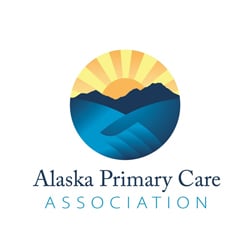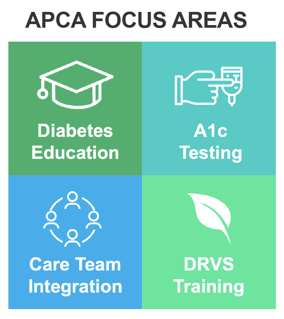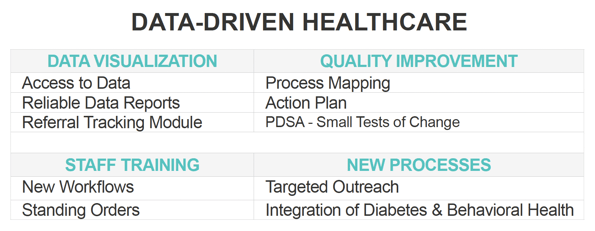Alaska Health Centers Improve Diabetes Care Through Data-Driven Healthcare Model
APCA and AQuIN use Azara DRVS as the foundation for patient identification, referral tracking, and reporting to drive improvements in diabetes care.
 Alaska’s Health Center Controlled Network (HCCN), Alaska Quality Improvement Network (AQuIN), a program of the Alaska Primary Care Association (APCA), is comprised of 20 participating health centers, currently 14 of which utilize Azara DRVS for population health reporting and quality analytics.
Alaska’s Health Center Controlled Network (HCCN), Alaska Quality Improvement Network (AQuIN), a program of the Alaska Primary Care Association (APCA), is comprised of 20 participating health centers, currently 14 of which utilize Azara DRVS for population health reporting and quality analytics.
AQuIN’s purpose is to support participating health centers by working together to advance the use of health information and analytics to improve and sustain the quality of care and health outcomes of patients. APCA procured Azara DRVS for specific community health centers to capture and analyze UDS data and other health, financial, and performance measures.
Given the disease burden of diabetes, AQuIN saw an opportunity to work with centers to lower diabetes risk by managing the populations with diabetes early and consistently to meet evidence-based guidelines and improve outcomes.

AQuIN developed the following goals:
- Realize healthcare cost savings by identifying and increasing primary care screenings and preventive activities.
- Increase quality transparency with funders, policymakers, patients, and the public.
- Improve care coordination within health centers and communities.
- Facilitate health center transformations by using a technology solution that supports highly efficient, team-based care delivery models.
- Empower health centers with their own analyzed data, allowing them to make and measure improvements and be ready to enter value-based agreements with carriers.
Data-Driven Healthcare Using Azara DRVS
To help achieve the identified goals, AQuIN convened their first bi-annual Data Summit in April 2018, bringing together key health center personnel from across the state. Since then, APCA has hosted biannual Data Summits for Alaska health centers.
Improving hemoglobin A1c control has the potential to save lives, lower costs, and improve overall health. Using the data analytics tools and patient registries provided by Azara DRVS, AQuIN set out to improve hemoglobin A1c untested rates and improve hemoglobin A1c control using a new data-driven model set forth at the Data Summit.

Results
Measuring A1c control for patients with diabetes is important in identifying who is not being screened, ultimately resulting in cost reductions and life-years saved. In 2018 and 2019 three centers adopted the use of DRVS to improve care for patients with diabetes. They focused on improved workflows and the integration of data to drive change around two key areas: A1c testing and referral to Diabetes Self- Management Education and/or Diabetes Prevention Programs.
A1c Testing & Control
Standardizing and training on diabetes A1c workflows was a key aspect of the work APCA collaborated on with center staff. As a result, patients with diabetes seen at the three centers from 2018 to 2021 had an improvement in A1c testing of 6.2%.
At the population level, 69% of all patients with diabetes at the centers have an A1c less than 9%, with an average A1c score of 7.6%. Of the patients with diabetes who were also seen in 2018, 80% have an A1c less than 9%. All three centers saw an improvement in the average A1c control in the last 12 months, with 24% of patients seeing a clinically significant improvement (>=1.5% drop in A1c) in their score. When looking at patients seen from 2018, 28% of those patients saw a clinically significant improvement in their A1c control.
 Scalability
Scalability
Health centers have now integrated the new workflows and use of data into their daily routine to improve diabetes hemoglobin A1c screening and control rates at their sites. With a focus on referrals to Diabetes Self-Management Programs and A1c lab collection, the centers are poised to continue to see improvements on A1c control.
Diabetes hemoglobin A1c control continues to be a state and nation-wide area of improvement. The scalability of the data-driven model has enabled the Alaska PCA to acquire additional funding from the Centers for Disease Control (CDC) through the State of Alaska and the National Association of Community Health Centers (NACHC). This data-driven model of care is also being used to improve measures for cancer screenings, diabetes, hypertension, and immunizations.
To learn how Azara Healthcare can help empower your organization to improve the quality and efficiency of care for your patients, contact us at solutions@azarahealthcare.com.
Something Powerful
Tell The Reader More
The headline and subheader tells us what you're offering, and the form header closes the deal. Over here you can explain why your offer is so great it's worth filling out a form for.
Remember:
- Bullets are great
- For spelling out benefits and
- Turning visitors into leads.
